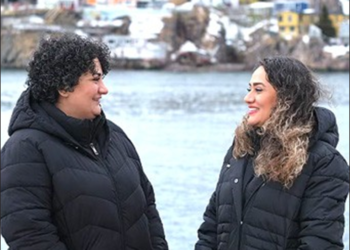July 11, 2014

A Canadian film company owned by Iranian immigrants is under suspicion of charging Iranians to sponsor their immigration to Canada by masquerading as their employer.
The Parvaz Film Corp., based in British Columbia, has been placed on a blacklist by the federal government after a pair of former employees accused the firm of abusing the Temporary Foreign Worker Program. Parvaz has been suspended from using the program while an investigation is underway.
Sareh Aminian and her husband, Payam Bakht, say they paid Parvaz Film $15,000 to come to Canada to work for Sherry Soltani and her husband, Majid Mahichi, who own Parvaz Film Corp.

The company produces cable TV shows for the Persian community and needs Farsi speakers. That dependency on Farsi speakers allows the company to bring in people from abroad, rather than hire Canadians.
According to Mojdeh Shah-riari, an immigration lawyer who represents Aminian and Bakht, Parvaz Film had promised the couple jobs that did not exist.
The $15,000 was supposedly charged to cover Bakht’s work permit and the screening process that demonstrates a business has been unable to find a Canadian to fill the position.
Mahichi, who owns Parvaz Film Corporation, insists neither he nor his wife received any money from Aminian and Bakht. Mahichi said Bakht worked for the company and even appears in several TV shows, available online via YouTube.
“After a few sessions of filming and working with us, they disappeared,” Mahichi said. He said he believes the company will be vindicated following an investigation, and intends to pursue legal action against the Iranian couple.
Sareh Aminian told the Canadian Broadcasting Corp. (CBC) her husband was only given one day’s paid work.
The couple entered Canada in March 2013, under contracts with Parvaz Film Corp. originally signed in 2011 and 2012.
“After you get this situation, you pay $15,000 and after that … where is my money? Where is my job? I always ask — when can I start my job?” said Amin-ian’s husband, Payam Bakht.
“I am telling you, I got very, very bad depression. We don’t have anybody here. No relative here, no friends here.”
Aminian and Bakht also said that once they were in Canada, Parvaz Film told them that if they paid an additional $1,200 per month to the company in cash, it would remit false payroll taxes to government, so the couple could pretend Bakht was working, and stay in Canada.
“We didn’t have job, we had to pay tax, and if we didn’t pay tax we had to leave Canada,” said Aminian. “We have to pay $1,200 each month, without any work and without any salary.”
Instead of paying the “tax” to the employer, they cut off all contact and went to Shahriari, the immigration lawyer, who filed a successful refugee claim on their behalf, based partly on evidence from the money-for-jobs scheme.
“Once they got here they were surprised to find not only is there no work for them to do — no salary — but they had to pay the employer even more in order to keep their worker status,” said Shahriari. “It’s like extortion, really.”
Shahriari was worried other workers would be exploited. She reported the case with docu-mentation to the criminal investigations branch of the Canada Border Services Agency, 11 months ago.
But no action was taken against the film company until after the CBC broadcast a segment about the immigrant couple’s experience with the film company.
The fraud the couple described has also been seen in the United States. Under US immigration law, firms are also required to seek first to find the skills they need among American citizens.
When those skills involve operating machinery, it is difficult to prove a need for an immigrant, but when the skill involves speaking and writing a foreign language, they can justify bringing in an employee from abroad. That opens the door for fraud in which an American or Canadian business charges a foreigner to bring him into North American instead of paying a salary.
What appears to be unique about the case of Aminian and Bakht is that they say they were not a party to the fraud they describe, but a victim.
Parvaz Film was still advertising jobs for Farsi-speaking applicants earlier this year.
The contract signed by the couple specifies they must pay Parvaz Film Corporation $15,000. The couple paid the non-refundable fee in three installments.
Bakht and his wife are Iranian actors who have worked abroad for some time. They thought they had a promising future in Canada when Soltani offered Bakht a two-year contract, for $70,000 a year, to make a feature film in a Vancouver suburb.
Bakht told the CBC that once he and his wife were in Canada they soon ran out of money and had no way to earn more.
He said they were terrified of being deported to Iran. They said the Islamic Republic would punish them for doing popular Persian TV shows out of Malaysia, where they had been before coming to Canada.
“Because we worked two years for private channels, we couldn’t come back to Iran. We are in danger to put us in a prison,” said Bakht.
Because they now have refugee status, the couple can stay in Canada. They have a new baby and Bakht said he is having a hard time finding work. They are on welfare and said they feel very disillusioned.
“My heart wants that no one gets to Canada this way,” said Bakht.
Federal government insiders with knowledge of the Temporary Foreign Worker Program told CBC they often hear about schemes where foreign workers pay big money just to get to Canada and are then exploited.
“I have heard of dozens of cases like this,” said one senior government staffer. “The bottom line is there has simply been no appetite [to prosecute the companies].”
“Not every case is going to get dealt with. Somebody is going to have to draw a line to decide how serious a case is before you are going to designate resources [to prosecute],” a retired senior civil servant told CBC.


















